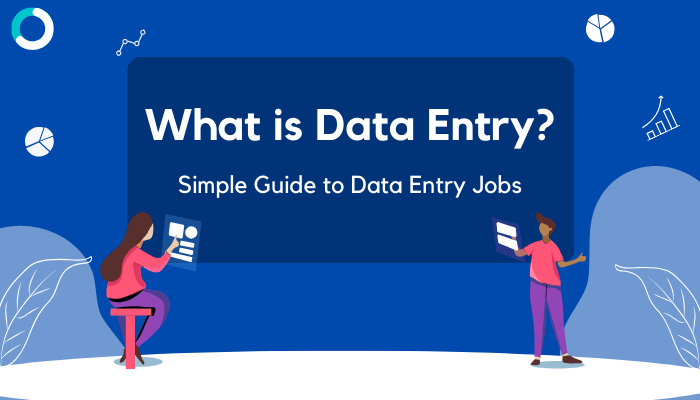Data entry is a fundamental task in many businesses today. It involves inputting, updating, or maintaining information in various formats. Whether you're filling out spreadsheets, updating databases, or converting handwritten notes into digital records, data entry plays a crucial role in keeping information organized and accessible.
In this article, we'll explore what data entry really means, the different types of data entry jobs you might encounter, and the essential skills needed to excel in this field. Whether you're considering a career in data entry or just curious, this guide will give you a clear understanding of the basics.
Understanding Data Entry
What is Data Entry?
Data entry is the process of entering, updating, or managing data in a computer system or database. It involves tasks like typing information into spreadsheets, entering customer details into a CRM system, or transcribing data from paper documents into digital formats. The goal is to ensure that information is accurate, up-to-date, and easy to access when needed.
While it might seem straightforward, data entry is a vital function in many industries, from healthcare and finance to retail and logistics. It's the backbone of record-keeping, ensuring that businesses can track transactions, manage inventories, and maintain customer relationships effectively.
The Importance of Data Entry
Data entry is essential because it keeps a company's information organized and accessible. Accurate data entry helps businesses make informed decisions, track performance, and maintain compliance with regulations. For instance, precise data entry can be the difference between a patient receiving the correct treatment or facing a medical error in healthcare.
Moreover, data entry supports automation and analytics. Businesses can leverage this information to identify trends, forecast future needs, and optimize operations by ensuring that data is entered correctly. In short, data entry is more than just typing. It's about ensuring the integrity of crucial business information.
Types of Data Entry Jobs
Data entry jobs come in various forms, each with its unique requirements and challenges. Here’s a breakdown of the most common types:
Online Data Entry
Online data entry involves inputting information directly into online platforms or databases. This type of work is often done remotely, making it a popular option for those looking for flexible work-from-home opportunities. Tasks might include entering product details into an e-commerce site, updating customer information in a CRM system, or inputting data into cloud-based applications.
Offline Data Entry
Offline data entry is similar to online data entry but does not require an internet connection for the primary tasks. It typically involves working with software programs like Microsoft Excel or Word. Examples include entering data into spreadsheets, converting paper-based forms into digital formats, or compiling data from various sources into a single document. Once the work is completed, it can be uploaded or shared as needed.
Manual Data Entry
Manual data entry involves physically typing or transcribing data from one format to another. This could include copying information from handwritten documents, printed materials, or audio files into a digital format. While this can be time-consuming, it's often necessary when dealing with non-digital sources or when accuracy is critical.
Automated Data Entry
Automated data entry leverages software tools to extract and input data without manual typing. This might include using OCR (Optical Character Recognition) technology to scan and digitize text from documents or employing data scraping tools to gather and input information from websites. While automation reduces the time and effort required for data entry, it still requires oversight to ensure accuracy.
Skills Needed for Data Entry
To excel in data entry, you need a specific set of skills that ensure accuracy and efficiency. Here are some of the key abilities:
Attention to Detail
Attention to detail is crucial in data entry. Even small mistakes can lead to significant issues down the line, such as incorrect reports or data discrepancies. Being meticulous and careful helps ensure that all information is entered correctly and consistently.
Typing Speed and Accuracy
A good typing speed is essential for completing tasks efficiently, especially in high-volume data entry jobs. However, speed should never come at the cost of accuracy. Being able to type quickly and accurately is a valuable skill that can significantly improve productivity.
Basic Software Knowledge
Most data entry jobs require familiarity with common software programs like Microsoft Excel, Word, and various data management systems. Understanding how to navigate and use these tools effectively will make your work easier and more efficient.
Time Management
Data entry often involves repetitive tasks that can become time-consuming. Strong time management skills help you prioritize tasks, meet deadlines, and maintain a steady workflow. This is especially important when working on large projects or under tight schedules.
How to Get Started in Data Entry
Finding Data Entry Jobs
Getting started in data entry is easier than you might think. Many companies offer remote data entry positions, making it accessible from anywhere. Websites like Upwork, Fiverr, and Freelancer are great places to search for these jobs. You can also find opportunities directly on company websites or through specialized data entry agencies.
When applying, it's essential to highlight your typing speed, accuracy, and any relevant experience with data entry software. A well-crafted resume that emphasizes these skills can help you stand out.
Tips for Success
To succeed in data entry, start by setting up a comfortable and quiet workspace where you can focus without distractions. Invest in a good keyboard to enhance your typing speed and comfort. Additionally, practice regularly to improve your typing skills and become familiar with common data entry software. Staying organized and double-checking your work will also ensure that you maintain high accuracy.
Conclusion
Data entry plays a vital role in keeping businesses running smoothly by ensuring accurate and organized information. Whether you’re just starting or considering a career in this field, understanding the basics and developing the right skills can set you on the path to success. With practice and dedication, data entry can be a rewarding and flexible job option.



